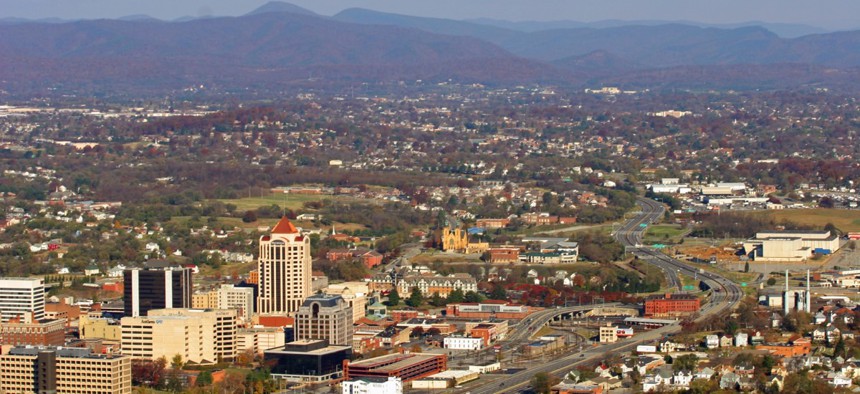Unsolicited Advice: Roanoke’s Next Mayor Should Avoid Praising the Darker Parts of U.S. History

Roanoke, Virginia Laura Glickstein / Shutterstock.com
It will take more than platitudes to rebuild trust with the city’s substantial immigrant community.
Unsolicited Advice is an occasional Route Fifty feature, where we offer our observations on state, county and municipal governments and the communities they serve.
Roanoke officials ran interference Wednesday evening, after the Virginia city’s mayor, David Bowers, cited Japanese-American internment during World War II as justification for opposing Syrian refugee resettlement in the region.
The outgoing mayor joined other state and local officials resisting resettlement given concerns that Islamic State terrorists could exploit the crisis to gain admittance to the United States, but he’s the first to gain national attention for his cringeworthy defense.
Politically ambitious, Bowers’ praise of the unwarranted imprisonment of Japanese and Japanese-Americans in camps following the attack on Pearl Harbor drew chastisement from prominent fellow Democrats and Republicans. But he’s left the City Council, which is considering censuring the mayor, holding the bag for doing damage control among Roanoke’s 97,000-plus residents.
“We were all, for the most part, taken aback by the mayor’s comments,” said Councilman Sherman Lea at the body’s impromptu news conference. “I’m not sure what Mayor Bower was thinking about when he made his statement, but we wanted to reassure the citizens that’s not the position of this city, administration and this council.”
Emotional opposition to resettlement has been strong in the wake of ISIS’ attack on Paris, with fears terrorists are posing as Syrian refugees rampant. A gaffe like this on the part of an elected official was bound to happen.
What’s baffling is that Bowers continues to stick to his guns. Admittedly speaking for himself, the self-proclaimed student of Franklin D. Roosevelt doesn’t see anything wrong with the wartime president’s tough choice to “sequester Japanese foreign nationals.”
“I understand how difficult a decision he made, but in the light of what was going on at the time he made the right decision,” Bowers told The Roanoke Times, after issuing his statement. “And I think the right decision now is not to have Syrian refugees here, now.”
Keep in mind, President Ronald Reagan signed the Civil Liberties Act in 1988 apologizing for the internment and paying $20,000 in compensation to each of the more than 100,000 survivors of the camps.
This isn’t Bowers’ first rodeo, the mayor having apologized in 2008 for comparing the closure of a local market to 9/11.
At its emergency press conference, the City Council didn’t exactly do itself any favors—much of its message muddled by the petty labeling of Bowers as “childish,” “juvenile” and “narcissistic.”
Sure officials awkwardly reminded residents Roanoke is a “six-time all-American city” with more than “105 ethnic populations,” but what about the city’s rich history of harboring refugees?
Instead, Council members seemed more preoccupied with Bowers’ political future, much in doubt now that he’s been dropped from presidential candidate Hillary Clinton’s Virginia Leadership Council for his comments.
“Dave is always running for something,” said Councilman Ray Ferris. “If you saw his interview with Channel 7 Sunday morning, he gave you a list of things that he’s thinking about running for, and in order to run for any of those seats, he’s got to move himself to the right. And this does it.”
Ferris, who said his ancestors hailed from what was once Syria, made the best point of the press conference—that the city lacks jurisdiction over refugees. The Obama administration has stressed the fact that the refugee program is determined under federal law, in response to mostly Republican governors saying they won’t accept more resettled Syrians at this time.
Virginia’s own Gov. Terry McAuliffe, a Democrat, said he would not block Syrian refugees, and the state Democratic Party chair and both local Democratic state lawmakers blasted Bowers’ statement.
“The internment of people of Japanese descent is a dark cloud on our nation’s history and to suggest that it is anything but a horrible moment in our past is outrageous,” Josh Schwerin, Clinton campaign spokesman, told BuzzFeed.
Perhaps the best response to Bowers came from actor George Takei, who spent four years in an internment camp and gave the mayor a history lesson regarding the misinformation in his statement. Takei, of “Star Trek” fame, closed by inviting Bowers to his Broadway production “Allegiance,” which tells the story of the baseless imprisonment that took place.
Faced with such powerful rebuttals and Bowers’ own intransigence on the matter, Roanoke City Council has a lot of ground to cover.
Lea, Vice Mayor David Trinkle and former state Sen. J Granger Macfarlane—all Democrats—are considering running for Bowers’ seat. The mayor announced he wasn’t seeking reelection Monday, before issuing his statement on refugees Wednesday.
Roanoke won’t recover from its “bad day” in a day, but the tone Bowers’ successor takes toward the city’s sizeable immigrant community is a good place to start.
“We want the real face of the city of Roanoke to come forward,” Trinkle said. “And the real face of Roanoke is a highly friendly, engaged and inclusive community.”
A tactful mayoral response might offer some proof, if not during this administration then the next.
Dave Nyczepir is a News Editor for Government Executive’s Route Fifty.
NEXT STORY: States Slowly Scale Back Juvenile Sex Offender Registries






